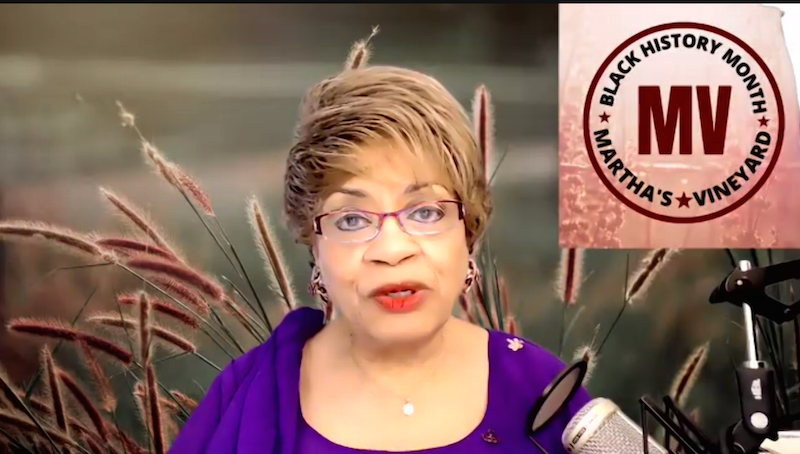On Saturday, viewers from around the Island and across the country joined over Zoom with steaming cups of coffee for a morning of music and celebration as part of the fifth annual Martha’s Vineyard Collaborative Black History event.
The event is co-hosted each year by numerous Island organizations, including the NAACP of Martha’s Vineyard, the Martha’s Vineyard Museum, the Oak Bluffs Library, and the Association for the Study of African American Life and History. It centered around themes of music, art and the black family, drawing on video, song and personal testimonies from a panel of speakers.
The morning began with a keynote address from Carole Copeland Thomas, who told a story from her childhood in Detroit, Mich.
“As a child, my mother said to me, you have a heritage,” Ms. Thomas told the audience. “She said that to me to remind me over and over again that as an African American . . . I still had a heritage and my people had a heritage. We stood tall, we stood strong and we always faced our issues and our challenges head-on, regardless of what they may happen to be.”
Growing up in the home city of Motown, Ms. Thomas said music played a major role in shaping her life.
“When I think about the music, I think about the syncopation, about the rhythmic patterns that were made on pots and pans, and secondhand drums and secondhand guitars in the studios of Motown,” she said. “Music is the emotional strength and energy that many of us have needed, whether we’re working in the fields or whether we’re working at home, whether we’re working in somebody else’s house and doing day labor.”
Broadening the discussion to include other forms of art, Ms. Thomas discussed the long and rich history of African American art, beginning with a story about Phillis Wheatley, a West African slave who became the first black woman and former slave to publish a book of poetry.
Later, Ms. Thomas shared a video spotlighting two contemporary artists — gallery owner Jumaane N’namdi and filmmaker Daniel Callahan — whose work reflects on what it means to be black in America.
“Oppressed people use their genius to define their identity,” she said.
Ms. Thomas also talked about how family stories can help preserve black art and culture. As an example, she shared a story often retold in her family about her ancestors during the Civil War.
“When you look at black people and you look at families like mine and so many others, you’re looking at people not just making black history, but making American history that doesn’t come and go,” she said. “Making history that leaves footprints and a legacy for us to lean on.”
After a brief musical interlude, the event turned its focus to the Vineyard community. Panelists from numerous organizations retraced the Island’s black history and shared their work.
Heather Seger of the museum showed a video narrated by Olive Tomlinson about the founding of the Shearer Summer Theatre, the Vineyard’s all-black theatre company in the 1940s.
Oak Bluffs public library director Allyson Malik discussed a new initiative at the library called Project Illuminate. The project is an oral history initiative, where residents of Oak Bluffs can record stories about the town and its place in the hearts of many black summer residents, she said.
Dr. Thelma Johnson, president of the Association for the Study of African American Life and History, gave a comprehensive history of Dr. Carter G. Woodson, widely considered the father of black history month. Representatives from the NAACP of Martha’s Vineyard also spoke about their ongoing fight for racial equality on the Island.
At the close of the event, as audience members took to the Zoom chat to thank the panelists, Ms. Thomas brought the group back to the music with a recording of Lift Every Voice — a song commonly known as the black national anthem: “Sing a song full of the faith that the dark past has taught us. Sing a song full of the hope that the present has brought us. Facing the rising sun of our new day begun, let us march on till victory is won.”







Comments (2)
Comments
Comment policy »